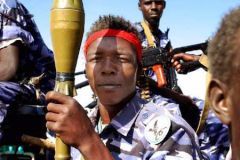Sudan launches major offensive against Darfur rebels
Sept 1, 2006 (CAIRO) — The Sudanese government has launched a major offensive against rebels in war-torn Darfur in recent days, human rights activists and African Union officials said Friday.

|
|
Sudanese national troupes . |
The fighting, which according to Human Rights Watch has involved government aircraft bombing villages, began as a senior U.S. envoy was in Khartoum to press the government to accept the deployment of U.N. peacekeepers in the western region.
Sudan on Thursday rejected as “illegal” a U.N. Security Council resolution paving the way for the replacement of an ill-equipped 7,000-strong African Union peacekeeping force in Darfur with more than 20,000 U.N. troops and police.
Government troops Monday attacked and later occupied Kulkul, a rebel-held village north of Darfur’s provincial capital el Fasher, David Buchbinder of Human Rights Watch said by telephone from New York, citing local reports. Two other rebel-controlled villages have since reportedly fallen under government control.
An African Union official in Khartoum, Sam Ibok, said that more than 20 civilians have been killed and more than 1,000 have been displaced since major clashes started early this week according to reports from the affected areas.
He said that these northern areas were a “no-go” zone for A.U. forces and therefore he had no precise information.
International observers in north Darfur reported that civilians attempting to flee the attacks in Kulkul were turned back by Sudanese government troops, according to Human Rights Watch.
Sudanese officials could not be reached on Friday, a weekend day, to comment on the reports. Rebel commanders did not answer calls.
The A.U. force has been unable to stop the humanitarian catastrophe in Darfur that has killed more than 200,000 people and left more than 2 million displaced over the past three years.
The conflict in Darfur began in 2003 when ethnic African tribes revolted against the Arab-led Khartoum government. The government is accused of unleashing Arab militiamen known as janjaweed who have been blamed for widespread atrocities.
A May peace deal signed by the government and one of the ethnic African rebel groups operating in the region has had little effect.
The African Union has called for the U.N. to take control of the peacekeeping force, whose formal mandate expires on Sept. 30.
But Sudan’s President Omar Al-Bashir has maintained steadfast hostility to the presence of the U.N. force, instead offering to send 10,000 government troops to Darfur.
U.N. Secretary-General Kofi Annan on Thursday released a letter he had sent to Al-Bashir urging him to accept a U.N force in Darfur, saying only an impartial peacekeeping force could implement the May peace deal.
Annan also expressed alarm over the recent deployment of large numbers of Sudanese troops in Darfur.
Eric Reeves, a professor from Smith College in the United States who is a prominent campaigner for an end to the Darfur conflict, said he had information that Minni Minnawi, leader of the only rebel faction to sign the peace deal, was collaborating with the government offensive.
He said his contacts told him that thousands of troops and janjaweed militias backed by Antonov planes that have been carrying out bombing missions have taken control of three villages north of el Nasher, Kulkul, Bir Maza and Sayeh.
“They are bombing villages without any regard for civilians, it is more genocidal violence. The end game is to take full control of northern Darfur and isolate the rebels,” he said.
John Prendergast, an expert from the International Crisis Group, a global think-tank, who was in Darfur until the end of last week, said the government offensive was provoking spiraling violence and reduced humanitarian access to the region.
Earlier this week the U.N.’s top humanitarian official, Jan Egeland, warned that “a man-made catastrophe of an unprecedented scale” loomed within weeks in Darfur unless the Security Council acted immediately.
Egeland said there could be hundreds of thousands of deaths if aid operations — already at grave risk because of rising numbers of attacks against aid workers, dramatically reduced access to those in need, and massive funding shortfalls — collapsed.
(AP/ST)
